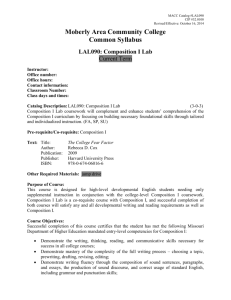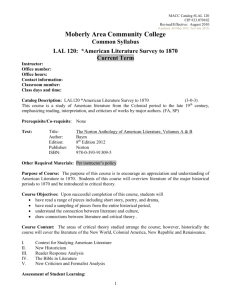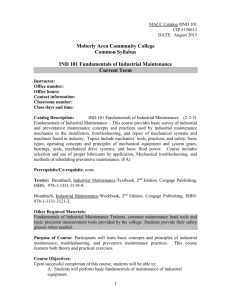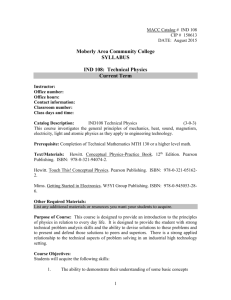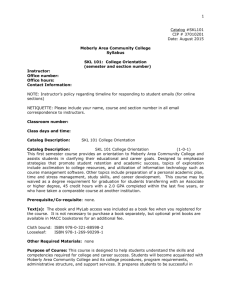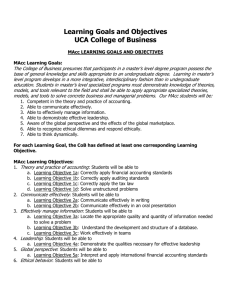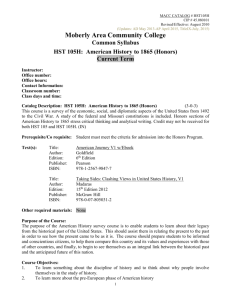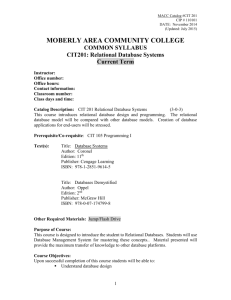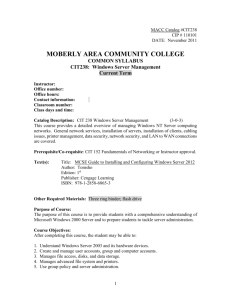LAL 020 Transition to Composition I
advertisement
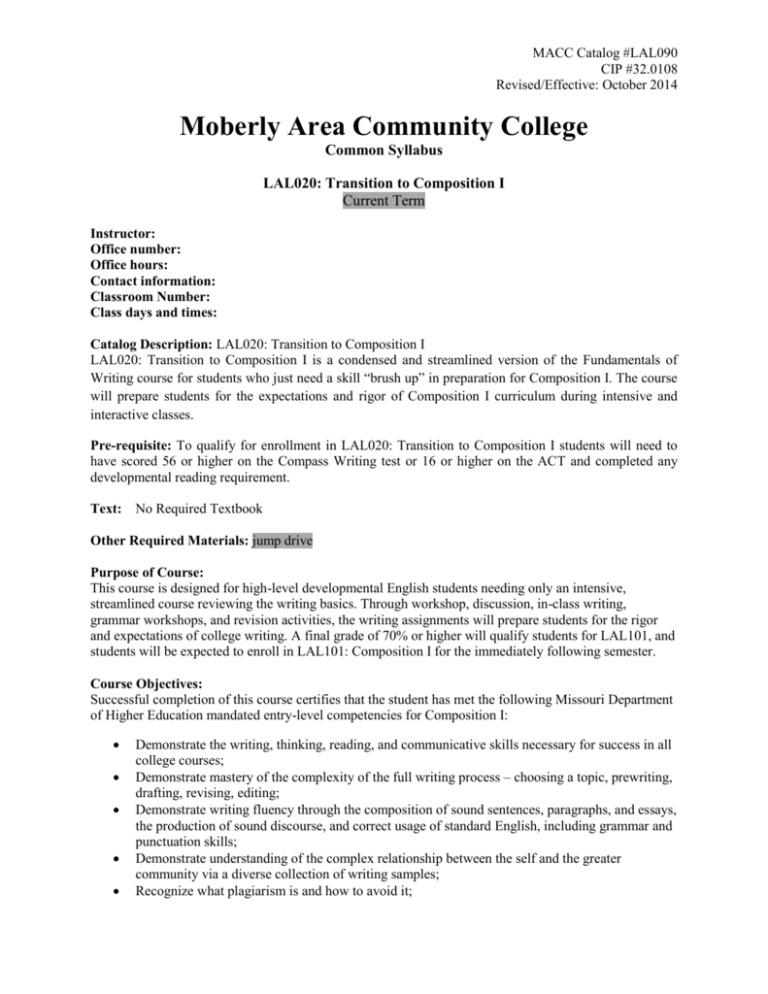
MACC Catalog #LAL090 CIP #32.0108 Revised/Effective: October 2014 Moberly Area Community College Common Syllabus LAL020: Transition to Composition I Current Term Instructor: Office number: Office hours: Contact information: Classroom Number: Class days and times: Catalog Description: LAL020: Transition to Composition I LAL020: Transition to Composition I is a condensed and streamlined version of the Fundamentals of Writing course for students who just need a skill “brush up” in preparation for Composition I. The course will prepare students for the expectations and rigor of Composition I curriculum during intensive and interactive classes. Pre-requisite: To qualify for enrollment in LAL020: Transition to Composition I students will need to have scored 56 or higher on the Compass Writing test or 16 or higher on the ACT and completed any developmental reading requirement. Text: No Required Textbook Other Required Materials: jump drive Purpose of Course: This course is designed for high-level developmental English students needing only an intensive, streamlined course reviewing the writing basics. Through workshop, discussion, in-class writing, grammar workshops, and revision activities, the writing assignments will prepare students for the rigor and expectations of college writing. A final grade of 70% or higher will qualify students for LAL101, and students will be expected to enroll in LAL101: Composition I for the immediately following semester. Course Objectives: Successful completion of this course certifies that the student has met the following Missouri Department of Higher Education mandated entry-level competencies for Composition I: Demonstrate the writing, thinking, reading, and communicative skills necessary for success in all college courses; Demonstrate mastery of the complexity of the full writing process – choosing a topic, prewriting, drafting, revising, editing; Demonstrate writing fluency through the composition of sound sentences, paragraphs, and essays, the production of sound discourse, and correct usage of standard English, including grammar and punctuation skills; Demonstrate understanding of the complex relationship between the self and the greater community via a diverse collection of writing samples; Recognize what plagiarism is and how to avoid it; MACC Catalog #LAL090 CIP #32.0108 Revised/Effective: October 2014 Be familiar with site resources, such as the Library, Learning Center, or Resource Room; Demonstrate ability to analyze, synthesize, and evaluate written material; Demonstrate expanded, college-level vocabulary; Demonstrate familiarity with various literary genres; Demonstrate note-taking and paraphrasing skills. Course Content: Writing process Critical reading and discussion Grammar and standard English usage Understanding audience and purpose in writing Reflective writing Sentence, paragraph, and essay structure and organization Sentence variety and voice Development of thought Statement to Connect Course with General Education Outcomes or Technical Program Outcome Statement: In compliance with MACC’s General Education outcomes, the student who successfully completes this course will be able to: I. Demonstrate effective written and oral communication skills Assessment of Student Learning: Homework/in-class assignments/group work/quizzes = points will vary Description of assignments: Essays: Essays will constitute a minimum of 70% of your grade and should demonstrate your understanding of college-level thought, development, organization, and purpose. This is how you put all of the individual pieces together and is why they represent the bulk of your grade. Steps of the writing process (outlines, rough drafts, etc.) will be collected and scored. In-class writing: in-class writing will prepare you for future courses containing essay exams and for spontaneous writing. We will do a variety of in-class writing assignments both related and unrelated to the present assignment. This is an excellent way to improve your writing, thinking, and communicative skills that you will need for your future at MACC and beyond. Homework/Grammar/Group work exercises: Throughout the session there may be smaller homework assignments or grammar-based practice. Quizzes: Quizzes will cover assigned material and readings. Make sure you stay current. Grading Scale: 100%-90% = A 89%-80% = B 79%-70% = C 69%-60% = D 59% or below = F MACC Catalog #LAL090 CIP #32.0108 Revised/Effective: October 2014 Grades will be calculated on total points and 70% mastery will be necessary for satisfactory completion of the course. Instructor Policies: Attendance: Any student who misses two consecutive weeks of class during a regular sixteen-week semester or the equivalent proportion of class time during a shorter session will be dropped from the class by the instructor unless acceptable justification is supplied. Additionally, any student who misses more than one-fourth of the entire number of in-seat class meetings in a regular 16-week semester or the equivalent proportion of class time during a shorter session, may be dropped from that class by the instructor if, in the opinion of the instructor, the student does not have reasonable opportunity to succeed in the class. A student’s attendance rate will be calculated based upon the first day of the semester (not the student’s date of enrollment in the course). Student attendance must be defined in a different manner for online, hybrid, and virtual courses. Student attendance in these courses is defined as active participation in the course. Online, hybrid, and vritual courses will, at a minimum, have weekly mechanisms for student participation, such as any or all of the following methods: a. b. c. d. Completion of quizzes or exams Submission of assignments Participation in threaded discussions Communication with the instructor A student who does not participate in an online, hybrid, or virtual course for two consecutive weeks will be dropped by the instructor unless acceptable justification is supplied. As with ground courses, a student’s attendance rate in online courses will also be calculated based upon the first day of the semester. If a student does not demonstrate active participation in the online course within the first two weeks (or the equivalent proportion of class time during a short session), the student will be dropped as “never attended.” Simply logging into an online class does not constitute active participation. Student should be aware that their dropping a course and their last date of attendance in the course may impact their financial aid. (Policy Handbook, I.090 and M.095) **Attendance is two-fold. First, you must be in attendance physically, but you must also be present in the class mentally if you intend to learn and succeed. Your motivation and dedication to learn, participate, and challenge yourself in and outside of the classroom will profoundly affect your level of success. Physically sitting in class is not enough to pass this course. Community Standards: All students are expected to participate in class discussions and in-class assignments. The attitudes and expressions of everyone in this class are governed by community standards. Our standard is one of relaxed decorum. Please be respectful of the instructor and of each other. In my classroom, everyone’s opinion has merit, and everyone is free to express it. Please be as respectful of others as you would like them to be of you. The Golden Rule definitely applies. Plagiarism and Academic Dishonesty MACC board policy is as follows: “Academic dishonesty by students damages institutional credibility and unfairly jeopardizes honest students; therefore, it will not be tolerated in any form.” Forms of academic dishonesty include but are not limited to the following: violations of copyright law, plagiarism, fabrication, cheating, collusion, and other academic misconduct. Incidents of dishonesty regarding assignments, examinations, classroom/laboratory activities, and/or the submission of misleading or false information to the College will be treated seriously. The procedure for handling MACC Catalog #LAL090 CIP #32.0108 Revised/Effective: October 2014 academic dishonesty is outlined in the Student Handbook (Policy Handbook M.010). In cases of alleged academic dishonesty, the burden of proof is on the student, not on the instructor. Americans with Disabilities Act Statement Students who have disabilities that qualify under the Americans with Disabilities Act may register for assistance through the Office of Access and ADA Services. Students are invited to contact the Access Office to confidentially discuss disability information, academic accomodations, appropriate documentation and procedures. For more information, please call either the Moberly office at (660) 2634100 x11240 or the Columbia office at (573) 234-1067 x12120, or visit our web page at www.macc.edu/index.php/services/access-office. Title IX Statement MACC maintains a strict policy prohibiting sexual misconduct in any form, including sexual harassment, sexual discrimination, and sexual violence. All MACC employees, including faculty members, are considered mandated reporters of sexual misconduct and as such are expected to contact the Title IX Coordinator when they become aware, in conversation or in writing, of an incident of sexual misconduct. For more information on this policy or to learn about support resources, please see http://www.macc.edu/sexual-misconduct-policy or contact Dr. Jackie Fischer, MACC’s Title IX Coordinator, at 660-263-4110, ext. 11236 or jackief@macc.edu.
